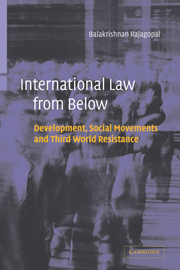Book contents
- Frontmatter
- Contents
- Abbreviations
- Preface and Acknowledgments
- Introduction
- PART I International law, development, and Third World resistance
- PART II International law, Third World resistance, and the institutionalization of development: the invention of the apparatus
- PART III Decolonizing resistance: human rights and the challenge of social movements
- PART IV Epilogue
- References
- Index
PART IV - Epilogue
Published online by Cambridge University Press: 09 July 2009
- Frontmatter
- Contents
- Abbreviations
- Preface and Acknowledgments
- Introduction
- PART I International law, development, and Third World resistance
- PART II International law, Third World resistance, and the institutionalization of development: the invention of the apparatus
- PART III Decolonizing resistance: human rights and the challenge of social movements
- PART IV Epilogue
- References
- Index
Summary
Mainstream international law, including the ‘new international law’ – differs from the concerns raised in this book in a number of ways. First, international law has traditionally seen the Third World in geographic, spatial terms, through the category of the state. As such it has tended to see the Third World's interaction with itself through that lens only. As I have suggested, however, patterns of Third World resistance changed significantly over the twentieth century and resistance can no longer be adequately grasped without adopting a social movement perspective to global and local change. Second, at a general level, international law has never been concerned primarily with social movements, save in the context of the self-determination and formation of states. It has treated all other popular protests and movements as ‘outside’ the state, and, therefore, illegitimate and unruly. This division has been based on a liberal conception of politics, which sharply distinguishes between routine institutional politics and other extra-institutional forms of protest. While there may have been some justification for this attitude before, now this model of politics stands heavily criticized in the social sciences. Due to its liberal conception of politics and its inability or unwillingness to factor in the impact of collective movements and forms-of-identity struggles other than nationalism, international law has remained strangely artificial and narrow. The exploration of a social movement perspective will, it is hoped, correct this institutionalist bias in international law. Third, international law's attitude to development has been fairly benign so far.
- Type
- Chapter
- Information
- International Law from BelowDevelopment, Social Movements and Third World Resistance, pp. 289 - 296Publisher: Cambridge University PressPrint publication year: 2003

